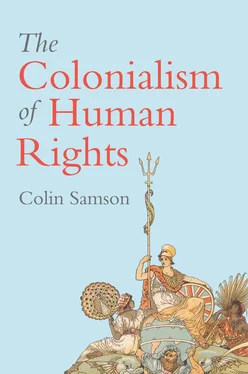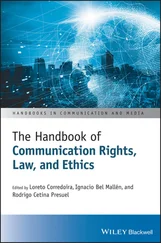French enslavement of Africans coexisted with more formal colonialism. Alexis de Tocqueville gave much thought to French colonization in Algeria. His preoccupations were somewhat different from those of John Stuart Mill since he was dealing with a settler colony, and Mill in India was not. When in his 1841 ‘Essay on Algeria’ he turns to looking at rights, he is far more concerned with the rights of the colonists than the colonized, and advocates making life for the former as close as possible to what it would be in France. However, ‘our great political institutions’ – which Tocqueville lists as elections, freedom of the press and trial by jury – ‘are not necessary for the infancy of societies’. 55He further contends that political liberties need to be suspended due to the necessity of militarily protecting the outnumbered French colonists, whom he believed needed to have their rights to colonize and appropriate land strengthened. He says little about Muslim Algerians rights to their property, and assumes that they will only benefit from French colonization as long as it is carried out thoughtfully. But, in 1848, Louis Napoleon came to power through a coup d’état , and then curtailed democratic rights, jailed opponents, set up penal colonies and declared himself Emperor for life. His twenty-year rule coincided with several foreign conquests, including Syria, Indo-China, and the establishing of Maximillian in Mexico, where liberal Republican rights were denied to local populations.
While hierarchies of rights holders were created in British and French colonies and in the home countries in the nineteenth century, as well as in colonial and slave societies such as the USA, such processes are mirrored in contemporary Western countries. The idea of civic stratification, first employed by sociologist David Lockwood to denote how social inequalities could be embedded in citizenship entitlements, differs only from what obtained in colonial situations in that the political setting is notionally non-colonial. For Lydia Morris, who developed Lockwood’s civic stratification more widely, the concept is:
implicitly concerned with the construction of ‘moral standing’ in society and explores the relations between possession or absence of rights and access to ‘moral and material resources’. Briefly put, the argument is that a regime of rights can both shape and be shaped by the moral standing of a given group in society such that an erosion of standing can undermine the enjoyment of, or claim to rights (civic deficit or civic exclusion), while the denial of rights further erodes moral standing. The converse would also apply, in that the accrual of moral standing in society, perhaps through the intervention of civic activists, can lead to an expansion of rights, or to enhanced enjoyment of a right (civic expansion or civic gain). 56
Morris argues that morality is used to construct hierarchies through which welfare rights can be claimed. Her research showed that the British Conservative government used a moral schema to justify cuts and exclusions, juxtaposing ‘hard-working taxpayers’ to morally suspect ‘dependents’. Indeed, ‘class inequality is being written more strongly into citizenship rights’. 57The way in which this occurs, at least in part, is through increasing conditionality on rights, and limiting the application of international human rights in the UK. The British government has recently conceptualized unworthy citizens and migrants within a similar analytic frame that stresses conditionality, thereby narrowing rights, ‘as the treatment of citizens comes more closely to approximate that of migrants’. 58Regimes similar to the colonial differentiation of rights have simply been imported into domestic British social policy. Civic stratification can be a general feature of government policy, as in Morris’ description, or it can be racialized, as with the denial of rights to citizens caught up in the Windrush scandal, as will be discussed in chapter 2.
The results of civic stratification were underlined by UN Special Rapporteur for Extreme Poverty and Human Rights Philip Alston’s 2018 report on the human rights implications of UK austerity policies. Alston’s report, substantiated by over 300 submissions, depicted Britain’s poor as including up to almost 50 per cent of children in the country, and, recalling nineteenth-century British middle-class attitudes towards poverty chronicled by Friedrich Engels, called Britain’s social welfare, ‘punitive, mean-spirited and often callous’. 59Public spending per head in England alone is projected to fall by about 18 per cent between 2010 and 2022, and the drastic cuts in public funding for schools, transport and housing will have disproportionately adverse effects on Britain’s burgeoning numbers of poor people. 60The social-welfare benefits and provisions that Britain offers have become more restrictive, through complex rules on eligibility and convoluted digitized access. 61All this translates into vastly different qualities of life and life expectancies, signalling that certain human rights – such as those to adequate standards of living, housing and schooling – are compromised for vast swathes of the British population. Following shortly after Alston’s report, a Human Rights Watch report on food poverty in the UK documented sharp rises in the use of food banks and other indicators of hunger, violating the basic human right to food for vast numbers of Britons. 62
Alston’s parallel report on the USA completed a year earlier was even more critical of the extreme inequality in that country – the highest in the Western world. It urged the US administration to acknowledge the important link between social and economic conditions and human rights. While the report is packed with statistical indices to support its conclusions, Alston’s impressions travelling through the USA starkly illustrate the dire situation of the 40 million Americans (12.7 per cent of the population) who meet official definitions of poverty:
I met with many people barely surviving on Skid Row in Los Angeles, I witnessed a San Francisco police officer telling a group of homeless people to move on but having no answer when asked where they could move to, I heard how thousands of poor people get minor infraction notices which seem to be intentionally designed to quickly explode into unpayable debt, incarceration, and the replenishment of municipal coffers, I saw sewage filled yards in states where governments don’t consider sanitation facilities to be their responsibility, I saw people who had lost all of their teeth because adult dental care is not covered by the vast majority of programs available to the very poor, I heard about soaring death rates and family and community destruction wrought by prescription and other drug addiction, and I met with people in the South of Puerto Rico living next to a mountain of completely unprotected coal ash which rains down upon them bringing illness, disability and death. 63
Alston also details projects, largely from the voluntary sector, that are attempting to address some of these problems, but the overall picture is of a massively wealthy country in which the state presides over the despair and destitution of so many of its citizens. His report was angrily dismissed as biased and ‘politically motivated’ by Nikki Haley, the US Ambassador to the UN, 64and in Britain, Theresa May’s Home Secretary, Amber Rudd, brusquely sidestepped Alston’s report saying it was of an ‘extraordinary political nature’. 65
These reports and the literature on civic stratification make essential a frame of analysis that centres possession of capital and power as features of human rights. In his essay on the sociological aspects of human rights, Ted Benton summarizes the Marxian position on such rights:
Читать дальше












